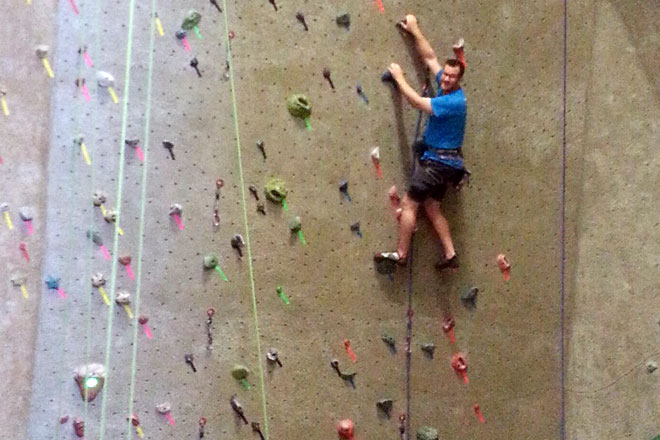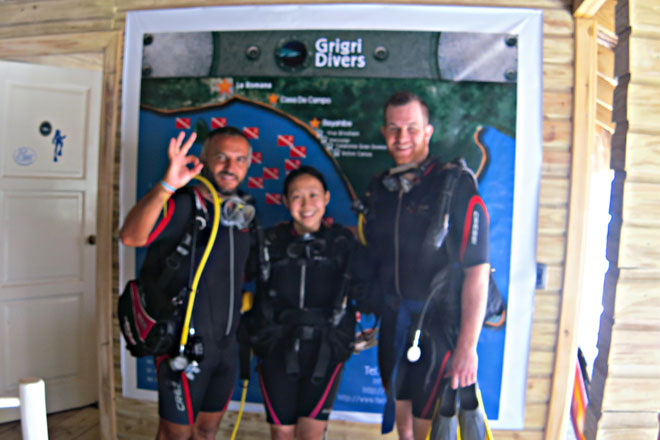
Last week, we went on an adventure–one that I have feared for a very long time. It was one of those opportunities that you have to jump on, as the conditions couldn’t be replicated anywhere else in the world. I wasn’t without hesitation, though.
I seem to have natural fears of being just about anywhere except flat ground. My fear of heights has always caused my palms to sweat even watching videos of tower climbers. Any time a second or third story railing is just a little bit too low I start to squirm uncomfortably walking next to it. I usually find myself moving over to the middle of the walkway and positioning myself as far away from the edge as possible.
To that effect, I joined a climbing gym in Minneapolis and spent last year conditioning myself to ease that fear of heights. It took a month or so, but after learning to trust my equipment, I could peer down from the tops of the 80 foot walls without issue. The practice and repeated exposure helped, but now that I don’t climb as frequently anymore I am less comfortable with it.

There is another relatively irrational fear that I’ve had in the opposite direction–the ocean, and more specifically, sharks. This may seem odd considering I live in landlocked Minnesota. Sharks aren’t exactly on my daily list of things to worry about, nor any huge bodies of salt water.
Despite this, I’ve always thought it would be really incredible to breathe underwater. I’ve had a recurring dream where I could breathe underwater and it was always amazing. I’d quickly submerge, fail to hold my breath for long, gasp for air, then realize that I could breathe. Moments later, I’d wake up and wonder if I’d ever be able to experience that in the real world.
As cool as that made it seem, I never thought I’d actually try scuba diving. I have a bit of a history with it, in fact.
In 2012, Amy and I had the chance to try scuba diving while in Hawaii for our honeymoon. Amy took the initiative to sign us up for a discovery dive so we could experience it. She had wanted to try diving for quite a while and was raring to go, but I wasn’t quite as pumped. It turned out, when the time came I had a sore throat, among other less significant excuses, that caused us to cancel our excursion. Regardless, I wasn’t quite ready to face that fear in a place I was so unfamiliar with.
Adding to my anxiety, at a dinner one night I spoke with a guy who, had heard, that there were lots of sharks near the islands.
After asking him a few questions, he told us that people regularly get rammed by six or seven foot sharks. Apparently, that is their way of figuring out whether or not you are a friend or food.
Yikes.
When we explained that we were going to go scuba diving but then cancelled, he said and I quote, “Yeah, I probably wouldn’t dive here.”
Oh. Okay.
At that point, my fear of diving took a firm grip on my psyche. While I tend to be relatively adventurous, diving was basically crossed off the list after that conversation.
Last week in the Dominican Republic, that all finally changed. Amy and I decided to go down for a bit of a Caribbean escape from a still-cold Minneapolis spring. We found a perfect one bedroom apartment on Airbnb in Bayahibe* and decided to experiment with working remotely for a week or so.

*If you’re ever visiting the DR, I’d highly recommend staying in Bayahibe instead of Punta Cana–unless you’re into the whole all-inclusive resort thing for $250+ per night, per person. The beaches are better, the culture is better, it’s more of a neighborhood and less of a resort-studded coastline. Additionally, our costs here are very low, about $55 each per night including rental car and food as we’re preparing most of our food at home.
We chose to stay in Bayahibe at the suggestion of my friend Ismael, who lives in the neighborhood. It turns out, he just so happens to be a divemaster and works for one of the dive shops here now. Originally from Spain, he moved to the Dominican Republic about five years ago for a hotel management job, got tired of it, and went to work at a dive shop. We were having dinner late last week and he suggested that we go diving with him. While I was hesitant, Amy was excited to go and insisted that we give it a try. Having known Ismael since he spent the summer with my family when I was 13, I figured he wouldn’t let us get eaten by sharks on our very first dive.
The logistics worked out, and the next day we found ourselves in a hotel swimming pool wearing a wetsuit and full scuba gear.
The first, and probably most difficult, part of the entire day was the three seconds of submersion. It was incredibly strange. For thirty years, my brain has told me to hold my breath if I go underwater and I had to do exactly the opposite.
The first inhale as I dipped below the surface went against everything my brain believed to be a good idea, but then it just kind of clicked. There I was, swimming around the bottom of the pool without coming up for air. We did exercises with an instructor to learn how to clear water from the face mask, what to do in case your regulator pops out of your mouth accidentally, and how to recover from various problems that might arise.
Upon finishing the exercises, training, and getting out of the pool I said, “Man, this is awesome. I can’t wait for the sea.”
It just so happened that that’s exactly where we were headed about an hour and a half later. Initially, we were planning on going out to the water the next day, but conditions were perfect–incredible visibility and calm waters. We took care of some paperwork, did additional informational training and loaded our gear onto a speedboat that would take us out to the reef.
As soon as we got to our destination, I was so excited I could hardly wait. We put on our masks, put one hand over the regulator, one over the back of our head, and fell backwards into the water. It took about five minutes for us to slowly descend to a depth of nine meters (about 28 feet) while equalizing our ear pressure every three feet.
Just like on a plane, swallowing or pretending to blow your nose while holding it will help equalize and reduce the pressure on the eardrums.
Once we reached our final depth, it was completely surreal. Swimming around next to wildlife that I had only ever seen on TV was quite literally breathtaking. I was so busy looking around that I’d forget to keep breathing every now and then.

After 40 minutes we slowly made our way back up the surface, removed our equipment and got back in the boat.
In the end, I can’t imagine that I had been so afraid of doing this. Experiencing near weightlessness while breathing underwater, and being at home with fish and creatures of all sorts was a blast. With the training we received, I felt very comfortable the whole time and even wanted to stay down longer than we did. The question is, what changed and how was I able to get over my fear?
The biggest factor that changed from my no-go dive in Hawaii, was having someone experienced that I really trusted along with us. For Ismael, it was pretty easy for him to convince us to go for a dive and have us feel like everything would be just fine. He also told us that in 500 dives, he had never even come close to seeing a shark in this part of the water. That was a relief, in particular.
After all this, there is probably one super important lesson that I took away from the entire experience. If you want to do something, talk to someone you trust that has done the thing you want to do. Don’t bother taking opinions from random people, especially other people that are also afraid of doing what you are afraid of doing. Our brains can come up with enough reasons to be scared of something on our own, we need not let other’s fears compile with our own.
Just like we went in the very safe pool to introduce ourselves to the scuba gear and the feeling of breathing under water, there are ways to use exposure therapy to slowly overcome your fears. By taking small steps, while uncomfortable, you can become more confident in your abilities and eventually tackle the bigger challenge.
My first diving experience is one that I’ll remember for the rest of my life. Looking back, I can’t imagine having not done it. It can be so easy to let typically irrational fear prevent us from doing incredible things in our lives. Despite my fears, some of the best and most exciting things have come from taking those risks, even the smaller ones.

What’s something that you have been afraid of doing that you want to tackle next?
